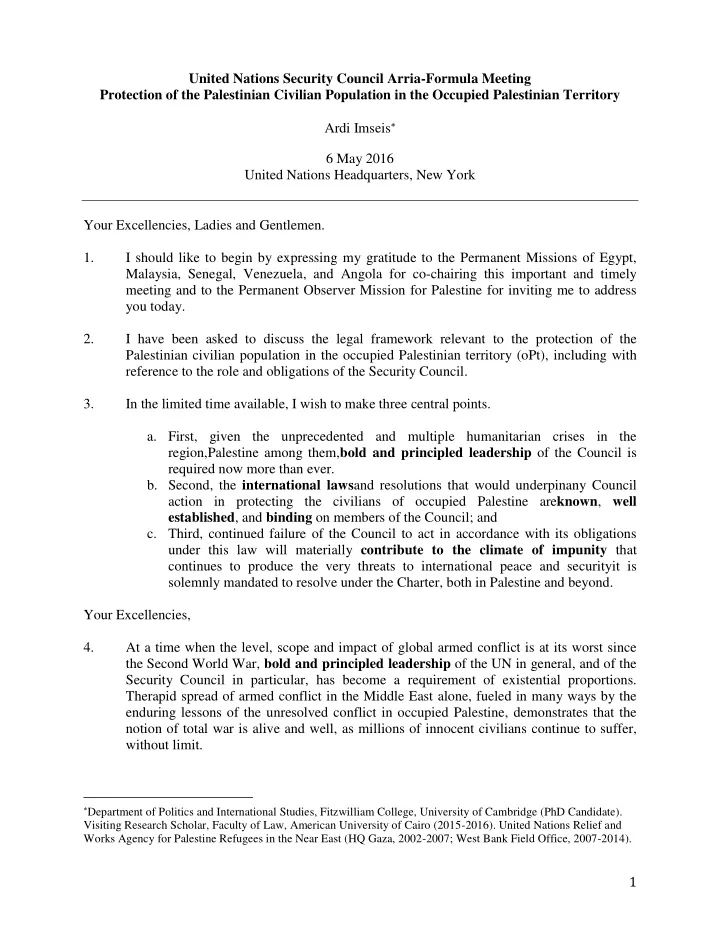

United Nations Security Council Arria-Formula Meeting Protection of the Palestinian Civilian Population in the Occupied Palestinian Territory Ardi Imseis 6 May 2016 United Nations Headquarters, New York Your Excellencies, Ladies and Gentlemen. 1. I should like to begin by expressing my gratitude to the Permanent Missions of Egypt, Malaysia, Senegal, Venezuela, and Angola for co-chairing this important and timely meeting and to the Permanent Observer Mission for Palestine for inviting me to address you today. 2. I have been asked to discuss the legal framework relevant to the protection of the Palestinian civilian population in the occupied Palestinian territory (oPt), including with reference to the role and obligations of the Security Council. 3. In the limited time available, I wish to make three central points. a. First, given the unprecedented and multiple humanitarian crises in the region,Palestine among them, bold and principled leadership of the Council is required now more than ever. b. Second, the international laws and resolutions that would underpinany Council action in protecting the civilians of occupied Palestine are known , well established , and binding on members of the Council; and c. Third, continued failure of the Council to act in accordance with its obligations under this law will materially contribute to the climate of impunity that continues to produce the very threats to international peace and securityit is solemnly mandated to resolve under the Charter, both in Palestine and beyond. Your Excellencies, 4. At a time when the level, scope and impact of global armed conflict is at its worst since the Second World War, bold and principled leadership of the UN in general, and of the Security Council in particular, has become a requirement of existential proportions. Therapid spread of armed conflict in the Middle East alone, fueled in many ways by the enduring lessons of the unresolved conflict in occupied Palestine, demonstrates that the notion of total war is alive and well, as millions of innocent civilians continue to suffer, without limit. Department of Politics and International Studies, Fitzwilliam College, University of Cambridge (PhD Candidate). Visiting Research Scholar, Faculty of Law, American University of Cairo (2015-2016). United Nations Relief and Works Agency for Palestine Refugees in the Near East (HQ Gaza, 2002-2007; West Bank Field Office, 2007-2014). 1
In September 2015 the President of Palestine called upon the UN to “provide international 5. protection for the Palestinian people in accordance with international humanitarian law” pending the conclusion of a just and durable peace that ends Israel’s almost 50- yearoccupation. 1 Since then, according to OCHA,almost200 Palestinians and 23 Israelis have been killed and over 22,000 Palestinians and 250 Israelis have been injured. 2 6. This is but the latest wave of violence in what is by now one of the longest running conflicts on the agenda at the United Nations. Decade after decade, Palestinian civilians have been compelled to endurethe hardship that many of their fellow human beings elsewhereare now tragically facingfor the first time. This includes a multitude of systematic and widespread violations of IHL, directed at both them and, often times, the humanitarian personnel mandated to ameliorate their suffering. In today’s context, therefore, the Palestinian call for international protection is 7. vitallyimportant. It demonstrates that without bold and principled action aimed at upholding IHL and other relevant international law, the short-term suffering of civilians today threatens to feed and produce long-term cycles of violencetomorrow. 8. These grave circumstances compel the international community, including through this Council, to reaffirm the importance not only of the applicability but also of need for the effective implementation of public international law as a means of protecting Palestinian civilians in the oPt.Far from being a mystery, that law is known, well established and binding on members of the Council. 9. In the context of occupied territory, the relevant law includesIHL, human rights law, and criminal law. For lack of time, I shall focus on IHL, in particular the law of occupation. 10. The law of occupation governs the administration of enemy territory captured as a result of an international armed conflict. It is rooted in two core principles: a. First, occupation is meant to be a temporary condition during which the occupying power isprohibited from altering the status of the territory, including through civilian settlement; and b. Second, an occupying power is not , by virtue of its occupation, sovereign in the territory it occupies. As affirmed by the Council, acquisition of territory through the threat or use of force is absolutely prohibited in international law. 3 11. Under the 1949 Geneva Convention Relative to the Protection of Civilian Persons in Time of War (Fourth Geneva Convention) and the 1907 Hague Regulations, 4 an 1 Statement by H.E. Mahmoud Abbas, President of the State of Palestine, at the General Debate of the United th Nations General Assembly at its 70 Session (New York), 30 September 2015, at: http://gadebate.un.org/sites/default/files/gastatements/70/70_PS_en.pdf . 2 See, OCHA Monthly Briefs for October 2015 - March /April 2016, available at: http://www.ochaopt.org/reports.aspx?id=118&page=1 . 3 See UNSCR 242 (1967), 22 November 1967, preamble ; See also Legal Consequences of the Construction of a Wall in the Occupied Palestinian Territory , Advisory Opinion (ICJ, 9 July 2004) at para. 87; andDeclaration of Principles of International Law concerning Friendly Relations and Co-operation among States in accordance with the Charter of the United Nations , Annexed to UNGAR 2625 (XXV), 24 October 1970, first principal, para. 10. 2
Recommend
More recommend